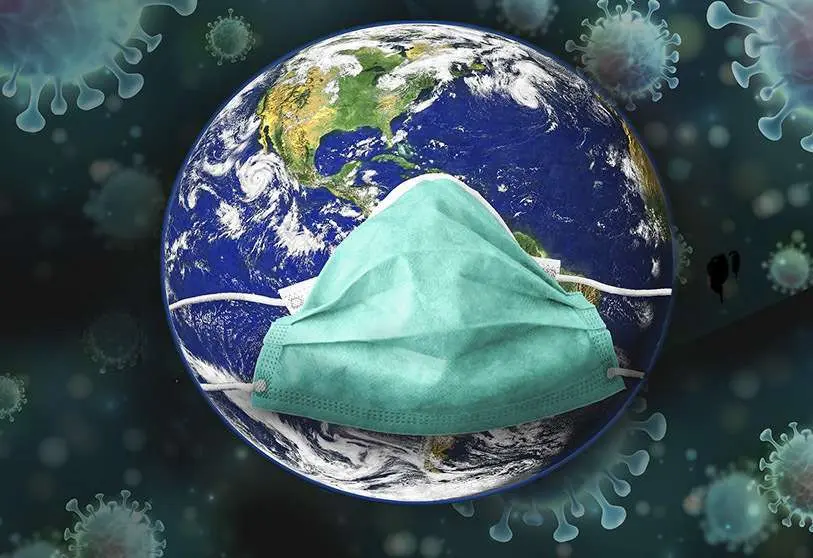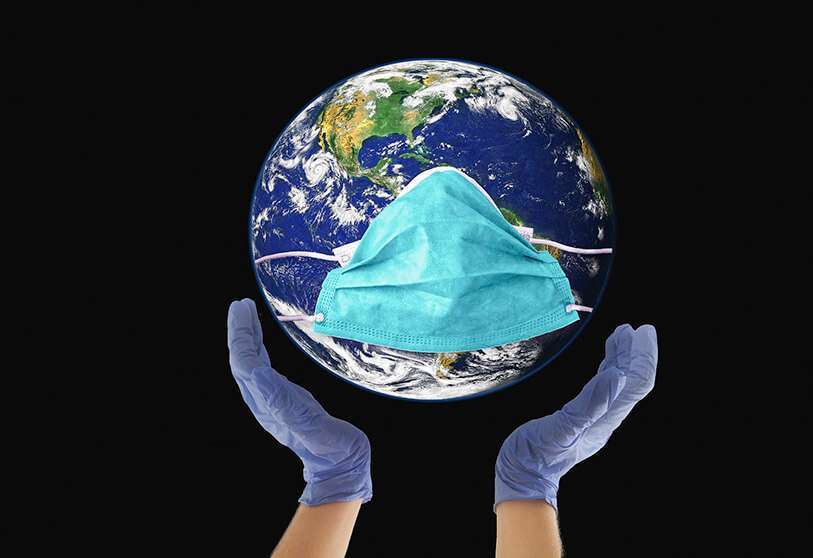Geopolitics of the mask

Sars Cov 2 or Covid-19 is the epidemic of the 21st century because of its spreading power. It has confined nearly 7.9 billion of the planet's inhabitants, infected more than 280 million people and killed more than 5 million. A pandemic, declared as such by the WHO on 11 March 2021, that has triggered more hoaxes than ever before and divided the world in two, between those who believe and those who do not, between pro-vaccine and anti-vaccine. And the debate, at a global level, is still raging between politicians, scientists and civil society itself, which cannot explain either the mismanagement or the contradictions of one or the other.
Despite this, the key element that had endangered the World Order was the "mask", which has unmasked the selfishness and fragility of International Relations that will mark a before and after in the world with consequences at the political, economic and social level.
At the beginning of February 2020, as contagions spread from Wuhan across China, the rest of the world was on tenterhooks. Governments seemed stymied, saying "it's a long way away" while pharmacies ran out of masks and airports were still wide open, welcoming passengers as normal. However, with the detection of the first cases in Europe and the Maghreb, in mid-February 2020, and in the face of the human avalanche in search of the already depleted masks, we were told that "they are of no use", that it was enough to "wash your hands" and keep a "distance of one and a half metres". These statements were unanimously repeated by health ministers and presidents of governments around the world, while the US, the UK and Brazil made denialism official.
The attitude of both sides has meant the beginning of improvisation and a monumental disaster that we could never have imagined. We have gone from "no masks" to compulsory masks under threat of fines, from the free movement of people to the Lockdown and the closure of borders. Mismanagement within the EU, a region endowed with "solvent" health systems, had been overtaken by events, with the exception of Germany. In Spain, to cite an example, chaos occurred in hospitals due to lack of protective equipment for health care and in the Residences where neither the Government of Sanchez, with Mr. Iglesias at the head of Social Affairs, nor that of Ayuso have managed to avoid so much misfortune that we have witnessed helplessly from our homes in a population as vulnerable as the elderly and the elderly.

At this juncture, China had become a focal point for the spread of the virus and a distribution centre for masks worldwide. Neither the US nor any European country had the production capacity to manufacture them. They all went to China to get them, triggering an embarrassing battle of land, air and sea. "All against all" or "Every man for himself" would have been two titles for a film based on real events. In Chinese ports and airports, the US diverted planes loaded with masks bound for Europe, Canada or Brazil at up to four times the price. France seized medical equipment from countries such as Spain and Italy. On 3 March 2021, Macron approved a decree authorising the government to seize the stock of key material against the coronavirus. The mask market had become the law of the jungle and the edifice of global geopolitics was collapsing by the hour, revealing the fragility of alliances between "friendly" countries and exposing the maxim of nations driven by self-interest. All this for the sake of masks that "everyone" had disavowed with crude arguments.
In the Maghreb, Algeria was dragging along a worrying political and socio-economic crisis that had worsened with Covid-19. The country was dependent on hydrocarbons and its falling prices, during the pandemic, plunged it into total ruin. Endless queues for grain, oil, milk (powdered) and even drinking water and oxygen for hospitals. Hirak, which managed to oust Bouteflika in 2019, has once again been tricked by the military after placing Tebboune in an election boycotted by the political forces in the midst of the health chaos.
On the other hand, Tunisia's economic and monetary crisis has also been aggravated by Covid, worsening the situation of Tunisians. Moreover, since the president, Kais Saied, decided to suspend parliament and dismiss the prime minister, no solution has been in sight, although the proposal for elections at the end of 2022 could be the beginning of a predicted instability if a presidential-style constitution is approved. In Libya, despite the deep political crisis, the Skhirat Agreements, promoted by Morocco and sponsored by the UN, have managed to unify the two parliaments, leading to the frustrated elections that were scheduled for 24 December and which were a glimmer of hope for a population eager to return to normality and to expel the foreign legions vying for hegemony on its soil.
Finally, the Kingdom of Morocco continued to stand out from its neighbours for its geopolitical and geo-economic achievements before and during the pandemic. Morocco's sovereignty over its southern provinces was recognised by the US, Colombia, the Gulf states and the entire Arab League, with the exception of Algeria, as well as by the UN Security Council, which reaffirmed, by Resolution 2602 of October 2021, the autonomy of Morocco's southern provinces under Moroccan sovereignty. It is worth noting the signing of the Abraham Accords, which enabled the re-establishment of idyllic relations with Israel. In addition, Morocco had excelled in its management of Covid-19 with strict measures, as well as in the manufacture and export of much-desired face masks and other medical equipment. As a regional and continental leader, it has again demonstrated its soft power by assisting the Maghreb countries, except for Algeria, which had refused to do so and plunged its population into chaos. He also assisted Lebanon and Palestine. In Africa, where Western solidarity had been conspicuous by its absence, sending, late and badly, outdated vaccines that ended up in the dustbin, the Kingdom of Morocco chartered medical aid planes to some fifteen countries such as Senegal, Niger, Chad, Burkina Faso, the two Guineas and the two Congos, Tanzania, Cameroon, Malawi, Zambia and Eswatini, among others.
Covid-19 also disrupted the economy, wreaking havoc with semiconductor shortages, threatening the hoped-for recovery and destroying thousands of jobs around the world. The main producers of these circuits, Taiwan and South Korea, had increased production during the confinement to meet the huge demand resulting from telecommuting. Today, production is blocked, leading to shortages and paralysis in the automotive and telecommunications sectors. This is yet another reason for China (the most affected) and the US to continue to keep the heat on the Pacific. A situation that has been aggravated by the signing of the AUKUS military agreement between the US, UK and Australia to defend their interests in the Indo-Pacific.
In the midst of the pandemic chaos, many governments had faced lawsuits against measures that civil society considered unconscionable. Some were upheld, others overturned in whole or in part, and many others dismissed, exonerating governments on the grounds of "the unknown". A new virus about which virologists had little or no information. However, they cannot be exonerated for being untruthful in denying the usefulness of the masks just because they could not provide them to their citizens at a crucial time. A counterproductive attitude that generated mistrust in society, exacerbating denialism and conspiracy theories of all kinds.
The masks, such a simple device that citizens around the world had ingeniously set out to manufacture, had managed to expose the electoral and partisan interests of politicians, as well as the fragility of the World Order.
Today, the explosion of contagions in this sixth wave of the new fast-spreading Omicron variant, in the middle of Christmas and at the beginning of the new year 2022, is only the second part of the mismanagement of a pandemic that still requires a mask as well as a vaccine. A management that could be decisive in the change of sign of many governments as soon as the polls open in Portugal, France and Italy (2022) or in Spain (2023).

